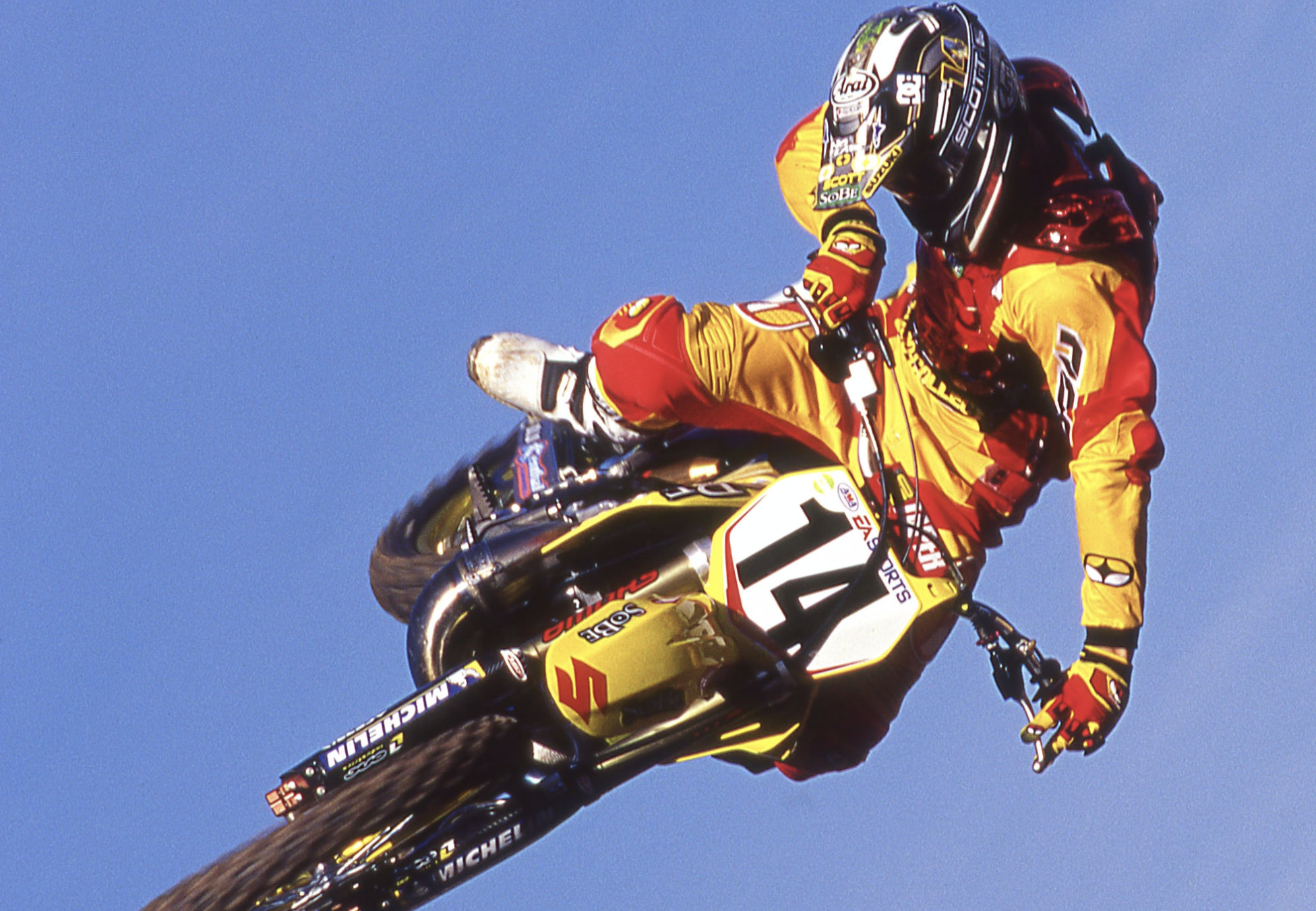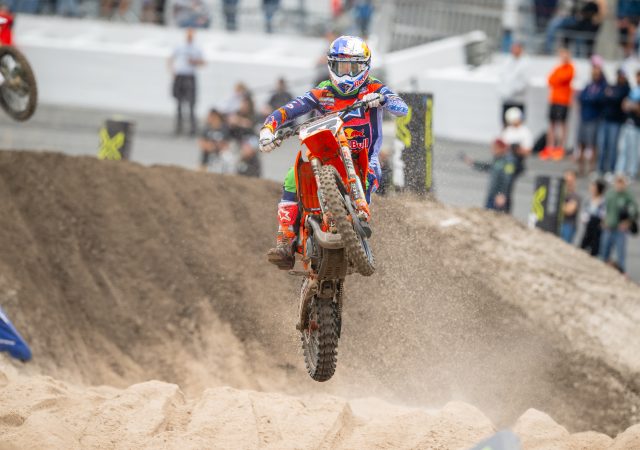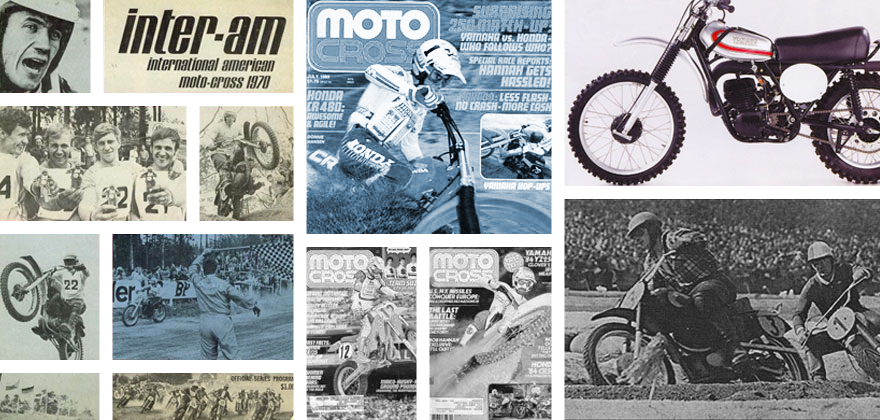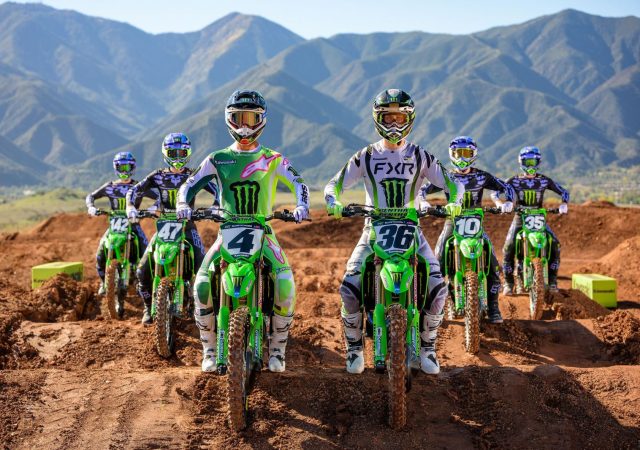Kevin Windham’s place in motocross history is well secured. Two championships, 46 wins in AMA Supercross/Motocross, wins in the Motocross of Nations and the FIM World Championship, and 15 top-three overall finishes—incredibly ten as runner-up to the champion. Simply put, Windham is a legend. The last ten years of his career, which ended in 2013, saw him become a massive fan favorite. It seemed like he could do no wrong.
This isn’t that story.
This is the lesser-known story of Kevin Windham losing his way mid-career—both on and off the track—getting badly hurt, and then retiring in 2002. Had he had stuck to his decision, the second half of his career would never have happened.
This is the story of Kevin Windham’s midlife crisis, as told by:
Kevin Windham: Factory Yamaha, Honda, Suzuki, and GEICO Honda rider
Rick Zielfelder: Owner, Factory Connection and part owner of GEICO Honda
Jeff Majkrzak: Part owner of GEICO Honda
Alley Semar: Windham’s race and practice mechanic
Chuck Miller: Off-road manager, Honda USA
Lars Lindstrom: Test mechanic, factory Honda
Jeff Surwall: Windham’s agent and No Fear MX owner
Roger De Coster: Former team manager, factory Suzuki
Jeff Stanton: Former champion and advisor, factory Honda
Randy Richardson: Michelin’s director of two-wheeled motorsports

Kevin Windham had left Yamaha, his first factory team, to go to factory Honda for 1999-2000. He won a lot of races for the Red Riders and worked with six-time SX and MX champion Jeff Stanton who was there as a rider advisor. Windham’s contract was up at the end of 2000 and Suzuki wanted the #14 bad.
Jeff Surwall: I probably met Kevin when he was about, I’m guessing fourteen, maybe. When he was an amateur, we [No Fear] sponsored him for some clothing, way before we made gear. Got to know his mom and dad, who were super nice and very involved in his racing. Kevin had so much talent at a young age, when he was getting ready to turn sixteen, he had offers from Honda and Yamaha. I started helping him with his agreements then. Kevin went with Yamaha. They [Yamaha] felt at the time more comfortable and just more of a friendly kind of easy-going start for Kevin.
Alley Semar: I started being his mechanic in 1995 but I’ve known him since he was just a little kid, though. Worked for him at Yamaha and then went to Honda with him also.
Kevin Windham: Things were great at Yamaha. I had just won two championships. Things were amazing. That whole thing with me going to Honda kind of came about from an off-track excursion where a couple of people including myself weren’t professional. It’s hard to talk reason or sense into the young kid that thinks he does no wrong. You talk to everybody that runs a team these days, the problem is young kids that come in there. What a nightmare some of these kids can be. I think I was kind of that same situation and problem.
Jeff Stanton: Kevin and Dottie [Windham’s wife] lived with us for a whole summer in 2000. We trained and worked together every day all summer. So, he was a blast. I loved him. Kevin was just so talented. He didn’t even really have to ride throughout the week. He just had to train enough to know that he could make it throughout the weekend. We clicked. That was the summer that he was just super fast in the outdoor nationals. Was winning a bunch of them. I believe he got hurt first part of the year, so it took him out of the championship. So he came back, lived with me for the rest of the summer and just dominated the rest of the summer.
Windham: When I went to Honda, I just got stuck in a rut. It’s a lot. At least in my day. I know kids train different now. They take the sport different from a younger age. I don’t know, man. I just felt like a lot of my career was tough on me because I felt like there were things that were like, I only had one career path, one thing to do, but it was just taking a lot out of me. I lost focus a lot. So we just kind of fall on the sword and jump from team to team to team and realized that none of it had to do anything with any team. It just kind of was all internal.
Stanton: End of 2000, he went to Budds Creek for the USGP. He’s like, “I don’t want to go to that thing.” Kevin is pretty money motivated. I’m like, “Dude. Let’s just go there. You’re going to win, and when you win, that’s your new Cadillac.” He wanted a new Cadillac in the worst way. “Dude, that’s your Cadillac. Let’s fly in there. We’ll go win the thing. That’s your new Cadillac. Done deal.” So that was the joke. Went there, smoked everybody, that was his new Cadillac. That’s what he wanted. That’s how Kevin was motivated and driven.
Surwall: I think Kevin was at a place where he had been racing since he was about four or something and just wasn’t enjoying it as much anymore at the time. I think Suzuki was a little bit more of a relaxed environment, and a little bit more freedom. He did get a great deal from Suzuki and really good money. He just had more comfortable surroundings. So, I think it was attractive to him for different reasons than just the money. It was also the comfort and the relaxed atmosphere.
Windham: Suzuki was a great program and Roger [De Coster] was an incredible individual, as everyone knows, through his history of racing and what he has done for the sport. I think really just looking back on it, or even at the time, I thought it was going to be the move that I needed to make to kind of get a fire lit under my butt. Kind of going into a bad place and bad train of thought and not enjoying the process, not enjoying the life of a motocross and supercross guy. I just felt like I needed a change. So the opportunity was there and I figured I’d take it just to see if that helped.
Stanton: I’ll never forget it. He was at the house and I’m negotiating Honda contracts. He’s in the middle of Suzuki. I’ll tell you exactly what he said to me. He said, “Jeff, I’m going to laugh all the way to the bank. I’m taking Suzuki’s money and I’m going to laugh all the way to the bank.” I said, “Kevin, you don’t care if you ever win a championship?” He goes, “No. I don’t ever care if I win a championship. I’m going to laugh all the way to the bank.” And he went to Suzuki.
Roger De Coster: It was a big contract. I don’t remember what it was now, but it was a good contract.
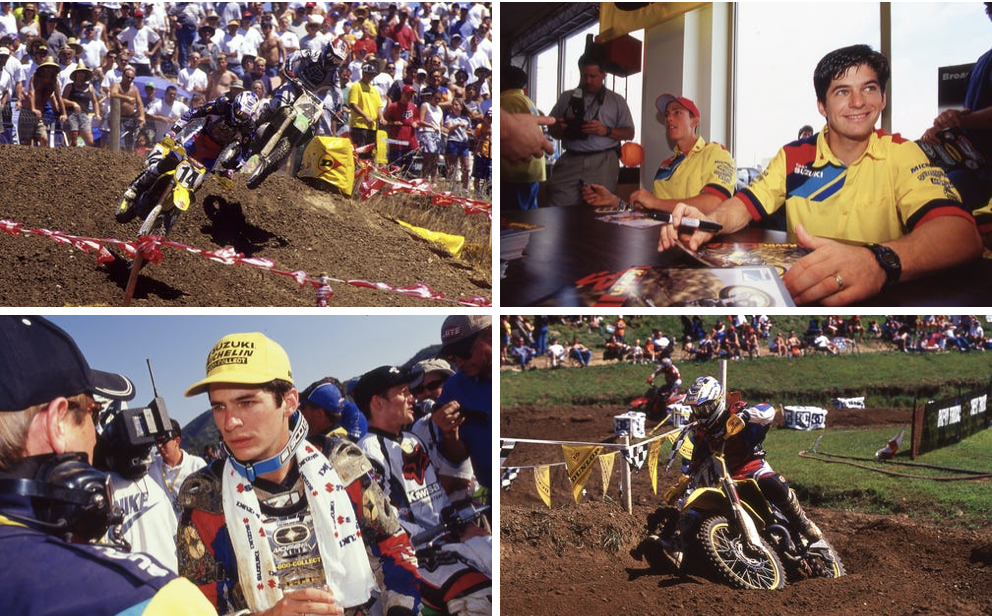
Windham: I don’t exactly remember how much money it was. I’m sure it was a lot, but I don’t think that was what was driving me at that time.
Semar: Roger had talked to him and he decided to give it a try. Was going to try something different. I think he was a little bit burnt out and that kind of junk, so he was just going to try something different.
Randy Richardson: I didn’t have a relationship with Kevin other than just being a fan of him in racing. Met him in the off-season of 2000 when he had signed with Suzuki. So we did some preliminary testing with Suzuki mid-year 2000, and then once they signed Kevin we went and tested with Kevin, once in California and then later went and tested at his place in Mississippi. I don’t know if it’s two southern boys, but we hit it off very well. He’s just so amazing on a bike and gave such great feedback. He knew exactly, whether it be the bike or the tires or whatever, he knew exactly what was happening and knew what he wanted from tires, bike, or whatever. So he was easy to work with.
Roger De Coster: Early on we actually went testing at his place close to Baton Rouge in Louisiana. He had a test track there and actually we tested. Some of the tests were with Travis [Pastrana] there at the same time. He was really impressive in the whoops, I remember. Somehow we had a DR-Z and he would go through the whoops with the DR-Z no problem. Unbelievable.
Richardson: I think Roger and everyone on board had some high hopes of the chemistry of those two [Pastrana and Windham] and maybe that Kevin would settle Travis down some, and maybe that Travis would spark Kevin some. They definitely had some fun back at the pond, for sure. I remember Kevin asking me once which tire I thought would be best for skimming across the pond. I had to tell him – Roger’s standing right there, so I said, “We at Michelin don’t recommend any of our tires being used for crossing a pond, but if I personally were going to do it, then it would be…” I recommended the tire that I would use. Officially at Michelin we don’t recommend that.
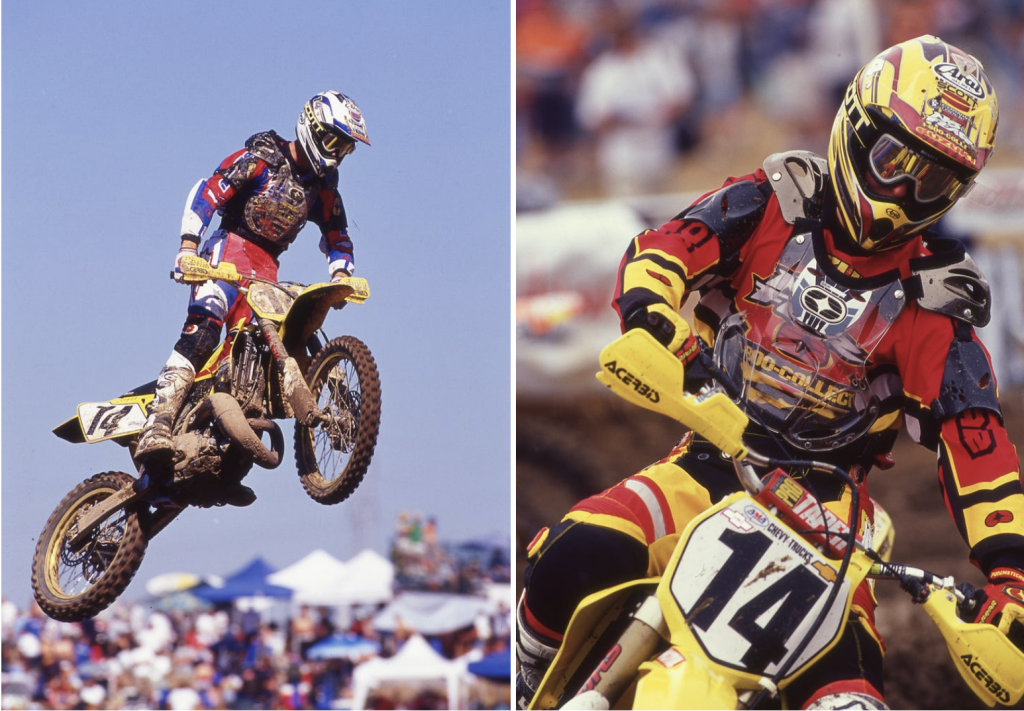
2001 wasn’t a bad year for Windham, his first at Suzuki. He won some nationals, scored a bunch of podiums and all in all, things went ok for Kevin that first year. The next year though, nothing seemed to go right for Kevin as burning the candles on both ends started to catch up with him…
Windham: 2001, that first year at Suzuki wasn’t bad. I think the team and the manager being Roger and riding with Travis and some of the things we were doing on and off track, life seemed to be pretty good. It was going decently well.
Semar: He thought the bike was good. I remember it was a little more forgiving, a little more flex in it. He liked it. He was going through some tough times.
De Coster: Yeah, there were some good spots. The talent was always there. As you know, he won Washougal and that’s a rider’s track. It’s technical and all that.
Surwall: I think Kevin got by for so long on just talent, and it was starting to change as you know with [Ricky] Carmichael and some of the guys training so much. Everything became a little bit more work-based and less just natural talent. You could get by for half the motos with natural talent, but the second half it was a lot more of what you did during the week.
Windham: During the Suzuki years, there was drinking and partying and all that kind of stuff. I’d be drunk on Friday night. I know people who have been champions who have done that, so I don’t know that it was necessarily anything other than just not putting in – and when I say not putting in the work, I mean not putting in work with an explanation point!
Jeff Majkrzak: Kevin was a legend. One of those Suzuki years, at the Minneapolis supercross, I remember walking by his motorhome and there was a party going on in the afternoon. I happened to be walking past. Right as I was walking past Kevin’s motorhome, Duke Finch from the AMA was walking by. I remember Duke shaking his head. I’ll never forget that image of the music going on. It was probably mid-afternoon right between practices. I was like, “Man, that guy’s got it going on.”
De Coster: I would be getting calls from Japan asking me what is going on with Kevin. With the rider, it’s hard when they have issues. The difficult part with Kevin is it’s hard to be tough and treat him tough because he’s a nice person. He was always polite. He’s basically a really good guy. We just had him at the wrong time.
Surwall: He was getting into diamonds and jewelry and everything else. A little bit of a rockstar mentality. At this point, Kevin’s never had a regular job. The money was coming in well over a million dollars a year, and at that age that’s a lot of money. He could have whatever he wanted. He could buy whatever he wanted.
Windham: At that point, I hated practicing. I hated training. Just was not doing what it took to perform like I could. I was naturally gifted, I would say, so I think that it was easy for me to ride well or post a good qualifying lap or maybe even heat races or get a start. Then you’re like, “Oh, shit. I got a start. Now what do I do?” So it just was a bad time for me and not professional in any sense of the word in my actions or lack of training and all the things it takes to be a professional.
Semar: He was still fast in the beginning of the motos, of the races. He would get arm pump or get tired, I do remember him leading laps or being top three a lot of times early in the races, and then kind of just fade back.
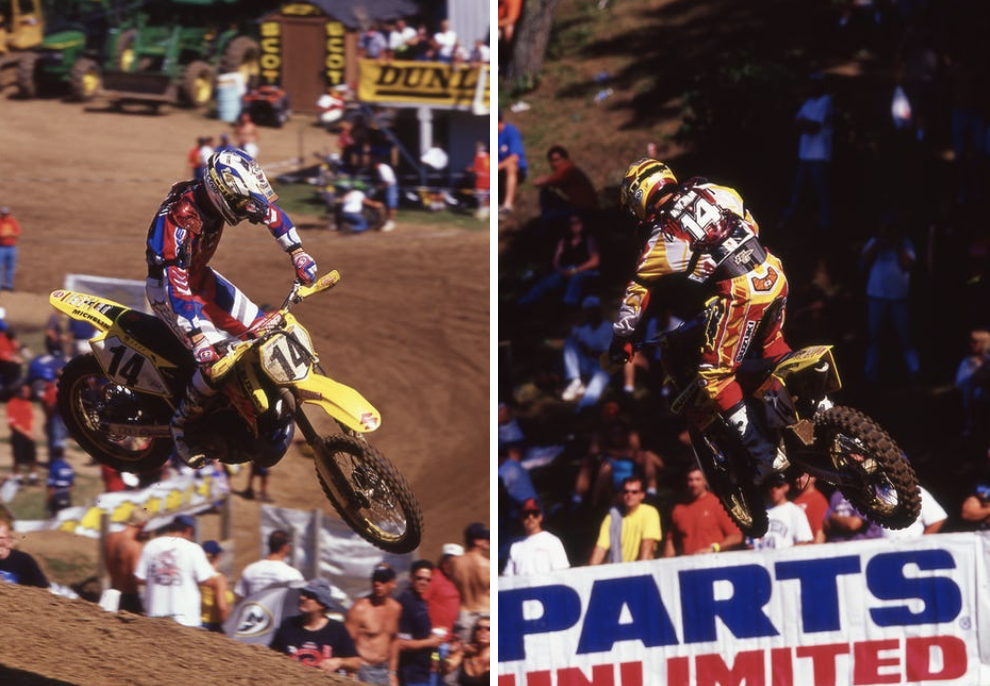
Richardson: I didn’t know any details of anything off the track. I wasn’t that close to him. I was close enough that I could tell Kevin Windham had changed and was changing, and it didn’t look like it was going in a good direction. I wasn’t close enough to him that I felt like I needed to give my input on what he should and shouldn’t be doing. I remember one of the Anaheims, I went just to talk with him. Went and knocked on the motorhome. He yelled “come in.” I go in there. Just going to tell him what tires we’re going to start with that day. He was standing there and he had a diamond necklace and a diamond Rolex and a diamond bracelet. He asked me, “Yo, Randy, do you think I’m too iced out?” I just looked at him and I said, “No. Just let me know when your next CD drops.” There was some tension. I thought it was funny. Maybe he didn’t.
Stanton: I had been trying to help him with everything that he had going on on and off the track. I loved both Kevin and Dottie and was involved in talking to some people in the sport that had some things to do with stuff that was going on. This one weekend I was doing just that and trying to help make things right. Thirty minutes later, Kevin comes running to the Honda pits. He’s ready to kill me. This was at the freaking race.
Windham: I vaguely remember that Stanton thing. There was a lot of people, Bevo [Forte] and Stanton that tried to talk to me. That’s the good thing that I think that you start to realize. I know I’ve stepped away and I think that’s just kind of my desire to be a father and be here for my kids, because that stuff can’t be replaced.
Stanton: I called Dottie and told her what I was going to do too. She was like, “I love you for everything you’re doing.” So, I’m like, “I’m over it. This had to happen. I did this because I’m one of your best friends. You can’t see that right now. Down the road you will, but I just had to.” So it all blew up that night. So Kevin went home the next day and him and Dottie have been fine ever since. Kevin did not talk to me for about three years.
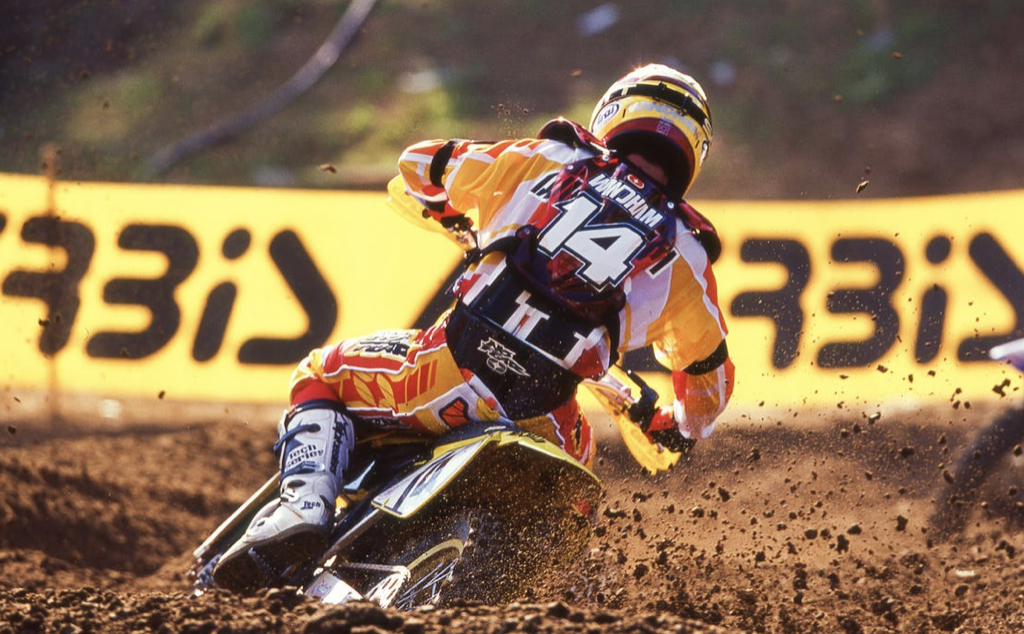
De Coster: It would be difficult to get really mad at him because he was always a nice guy. We talked to Alley about Kevin all the time, of course, Alley being so close to Windham. But he was frustrated also. He knew there was more there, but it didn’t happen.
Surwall: I’d try to talk to him. It’s hard when they’re in that spot too, and you got your guys going to the races that do the gear and the goggles and the other stuff and take care of them. They got to be his friend as much as anything else. You can’t really tell them. I would say things, and I know Roger was struggling with it.
Semar: Kevin’s a pretty strong-minded guy, so you could talk until you’re blue in the face. Ron Lechien told me one time, “People can talk to you. If you don’t want to listen, you’re not going to listen.”
Windham: I think the thing that Dottie, my wife, and Roger would comment and agree with is that I’m a real hard-headed son of a bitch. You’ll probably get that same answer from several people. Far too headstrong for my own good. That was kind of the story.
Semar: You can tell somebody something as much as you want and if they don’t want to listen, if they don’t want to hear it, not really listen. Not anybody knew what to do better than he did, but he just had a few struggles.
The accident happened Feburary 23rd, 2002 in practice at the Georgia Dome in Atlanta. Practice for the seeded 250 stars had just ended and Windham remained on the track and circled back around as the checkers were flying. He was going to try a new rhythm out there. He motioned to Alley Semar that he was going back around, lined it up and then disaster struck and yellow flags flew…
Windham: The way it came about was just kind of me and Travis having fun. The tracks back then, a lot of times the first turn kind of 45s in, and it actually starts into a rhythm section. At least it was a lot of those years. That outside berm was enough to kind of jump. You’d catch a little bit of air and it would be enough to kind of load that suspension right into the face of that little small jump. It gave me an opportunity to what I thought would be go for four. It was going to be a good line. It was definitely something that had it worked out could have potentially been a race line.
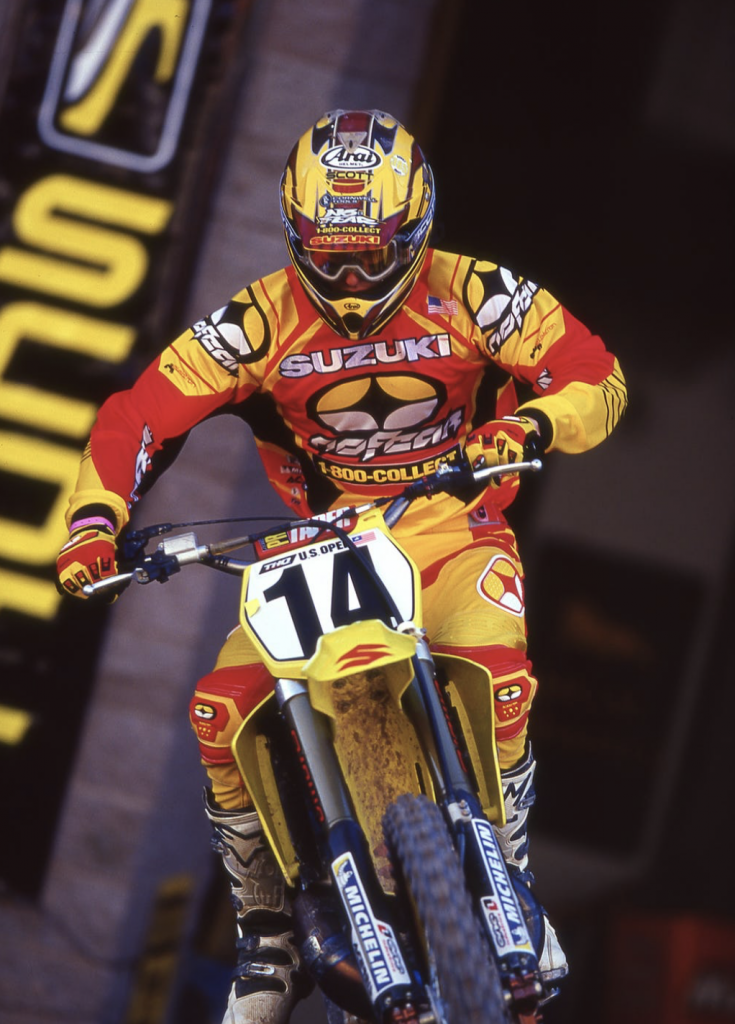 Semar: The funny thing about it, when we were talking and he asked me if he thought he could do this section, I thought he was talking about the section before. I think he wheelied over a berm and then did a three. He was talking about the second section. I was like, “Oh, yeah. You got that no problem.”
Semar: The funny thing about it, when we were talking and he asked me if he thought he could do this section, I thought he was talking about the section before. I think he wheelied over a berm and then did a three. He was talking about the second section. I was like, “Oh, yeah. You got that no problem.”
Windham: So the underlying problem was again just me. I think the crash was just us being kind of dumb. I do think it would have been a great race line and it was doable. I just missed it by a wheel!
De Coster: I was hoping to get out of Kevin what I always thought and still think he was capable of. He is a very good rider. We found out he had a lot of issues, personal issues, going on at the time. It was a difficult time. He did not ride to his potential, and then he broke his leg.
Windham: Again, with all the negativity that was going on in my mind, any kind of little dumb stuff that we could do, like betting if you could do the quad or whatever. It was kind of a nice, innocent way for me to feel like I took my focus off of the real task and try to find enjoyment in what I was doing. I felt super trapped. What’s a kid do? There’s only one path. You jump from team to team to team like we said I did, which I did. It’s still the same. It’s still round and round. You still got to run however many miles you’re running and do the same workout routine and work with your trainers and set your bike up.
Surwall: He was going the wrong direction and something was going to happen. It’s never good when you get hurt, but it let him step back, refocus, kind of see where he was at and appreciate I think a lot of things. It was hard to see and hard to watch.
Windham: It’s funny. Some of the things I remember about racing and 125 wins, there was a quad in Houston I had to do. Or that I didn’t have to do but I did, and I won by a lot. Back in the 125 days just being able to jump a triple was huge. Back when me and Stewart, we both crashed out in Vegas on 450s. He and I, I think were the only two doing this quad in this one turn. I think every race I ever won, at some point you’re kind of uncomfortable. There was some where you would just get the holeshot and you’d feel comfortable all the way through. But the majority at some point, one of those riders was doing something that they’re not super comfortable with. I think I was just another prime example of where I felt like it was an option to do a rhythm there and it just didn’t work out.
Surwall: Kevin was my friend as much as I helped him also. So it was tough. He was searching and kind of going sideways. Definitely I don’t want to say if he didn’t get hurt something would have happened. I don’t know if he would have quit racing or what, but he was definitely kind of going the wrong direction.
Windham: This femur break by far was the most painful injury that I ever had. It came out a little bit and I was super contracted. Everything was tightening up and the bone was coming out, and that kind of thing. I remember on the way to the hospital looking up to the ambulance driver and just making the driver a promise that if he didn’t slow down, when I got healthy, I was going to find him and whip his ass. He looked back and he said, “Sir, I’m doing 10.” I’m like, “Oh, crap.” It felt like he was driving NASCAR speed. There was a lot of pain involved in that one.
De Coster: I remember he was in pain. His contract was up at the end of 2002 but at that time I thought, better take care of him and did not think so much about what was next.
Surwall: I know Kevin felt bad for Suzuki. He’s a really nice person. He’s a good guy. It’s not Kevin’s personality, so it wasn’t easy for him either.
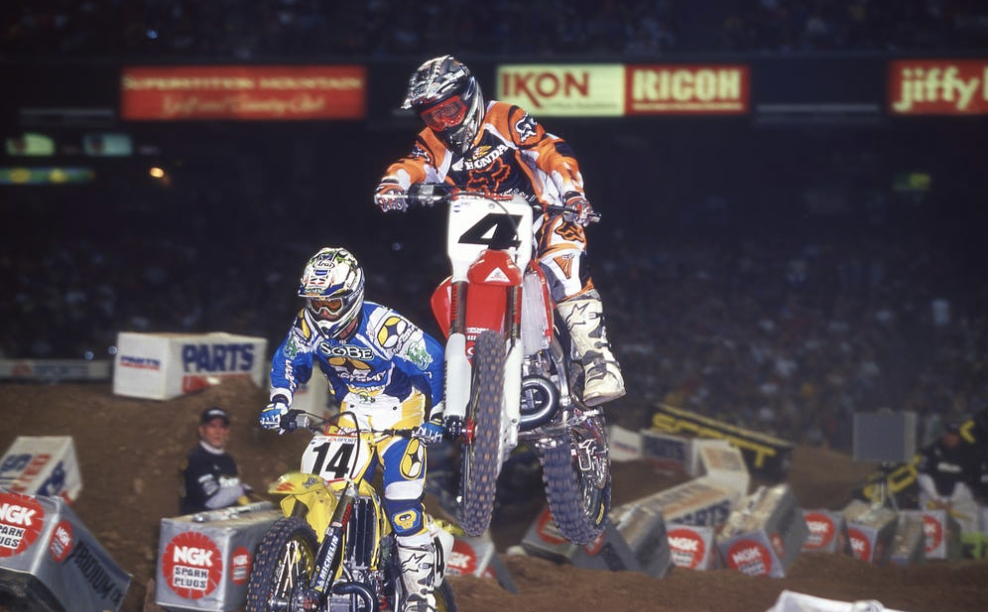 De Coster: Kevin has so much talent, but unfortunately for us we had him at a difficult time in his life and his career.
De Coster: Kevin has so much talent, but unfortunately for us we had him at a difficult time in his life and his career.
Windham: Late in my career, I was still racing, so it must have been ’10, ’11, something like that. I saw him [De Coster] walking down the corridor one time. Just me and him, nobody around. I just felt like I got to apologize to him, and probably everybody at Suzuki for that matter. So I was apologetic to him. It was really a great place. Look at what he’s done. It’s something I feel deep with regret not being able to capitalize on that opportunity. Like I said earlier, timing is everything. I was just in a bad spot.
Semar: I know I stayed with Kevin most of the time because I was out on a tractor one day and he rides up on a little mini bike with his leg in a cast straight up. He says, “Hey, I’m done.” I said, “What do you mean you’re done?” He says, “I’m done racing.” I’m like, “What?”
Windham: I had a couple little requirements Suzuki made me do, but that money dried up real quick, and rightfully so. I didn’t deserve any of it, to be honest with you, from that year anyway. Anytime someone is paying you to represent their company you owe it to them to put your best foot forward. I just simply didn’t do it.
Surwall: He told me, “I’m not coming back.” I didn’t know if it was forever, this year, or next year. I didn’t know how long. But we were kind of trying to regroup, and what are we going to do to fill his spot, as far as our business and other things. So it just sucked because at the time I didn’t know what he was going to do.
Windham: It was definitely the path that I needed. I don’t know that we made an official announcement, but where I was at, I was pretty truthful in the fact that I thought, this is retirement for me. I’m kind of done. Regardless of the quality of my leg post-surgery and rehabilitation and stuff. It was what I needed.
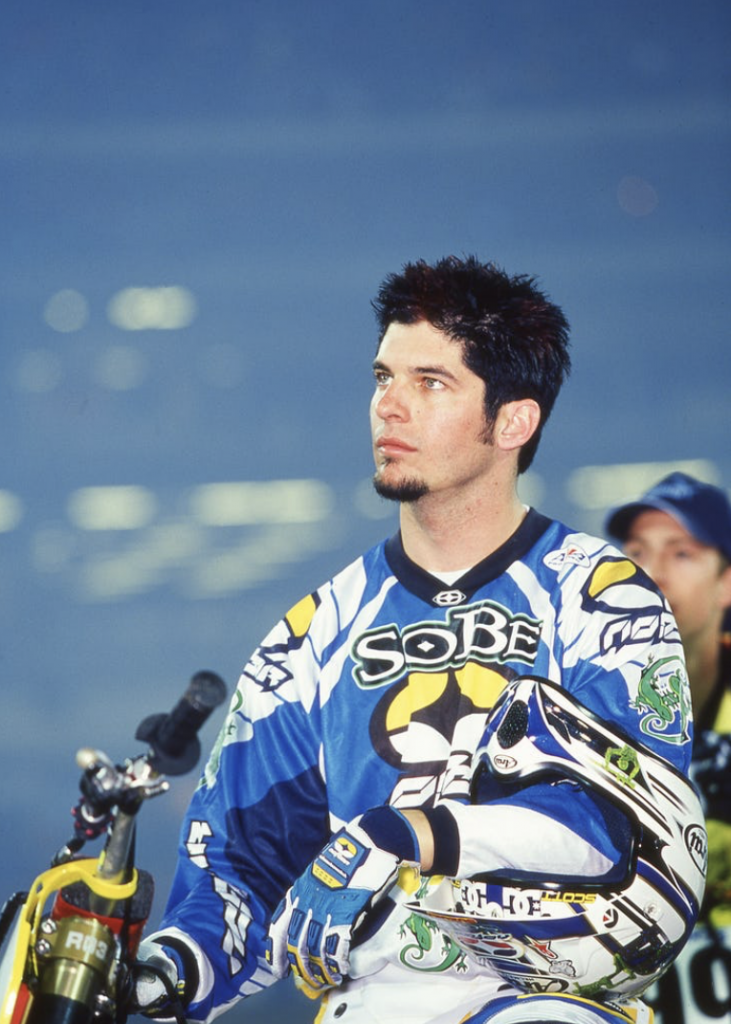
Surwall: I knew he was going to be out for quite a while. He just kind of retreated. I lost close contact. I would call him every month or two. Sometimes wouldn’t talk to him, sometimes I would. I would call Alley and keep in touch with him, just see how Kevin’s doing and what’s going on. For one as a friend, and two because we sponsored him. Suzuki, SoBe, everybody else. What the hell’s going on, kind of thing. He just kind of went dark and wanted to get away from it. The best part about it, like I said, was I think he kind of had some time to look back and appreciate it and figure out does he really like racing? Does he want to do this? At the time, he had probably been racing for twenty years already.

And with that, Kevin Windham was retired from motocross. One of the superstars of the sport, Kevin was in Mississippi with a broken femur and needed to get his life, his marriage, in order before anything else happened. Windham went from that date in February 2002 until March of 2003 without riding a motorcycle. Then, although the exact details are fuzzy for a lot of the people involved, a Honda CRF450R showed up at Windham’s house…
Stanton: After Suzuki was done, I was on an airplane with Majkrzak and Ziggy going to Anaheim 1 2003. We’re sitting on the plane talking and Mike LaRocco was going to be done, and they didn’t know what to do. They were like, “What do we do?” I said, “Why don’t you let me call Kevin Windham? Maybe he’ll come back. If we offer him that he’s the man and put him in ‘the man’ situation, I think he would do good if he wants to.” I said, “When I get off this plane and get my rental car, I’m going to call him on the way to the stadium.” I can picture the drive right now from John Wayne to the stadium. I can picture me talking to him the whole way, all the way there, about the situation. That’s really how it started.
Rick Zielfelder: I can’t say that I was friends with Kevin. I can’t say that I hung out with Kevin. There was a huge respect for Kevin and it was just a pass through the pits acquaintance type relationship prior. The Kevin situation is really, really unique on a lot of fronts. The man who gets all of the credit for Kevin Windham coming back and riding a Honda is Chuck Miller. Chuck Miller, not a lot of people in the moto scene outside of California know Chuck, but Chuck was a great desert racer. He’s worked for Honda for years. At one point in time, he oversaw all of racing at Honda. All of the various forms of motorcycle race programs were under his management.
Chuck Miller: Right about the time he left and went to Suzuki in 2001, I started in motorcycle sports at Honda under Gary Mathers, and then around 2001 I started doing the race team thing and doing the motocross and supercross stuff.
Zielfelder: At that point in time when Kevin was in his hiatus, he was the one that said, “You know what? I’m going to send him a CRF450 because I believe that guy would be great on one.” And he did. He just sent a bike to Kevin. Had nothing to do with our team. Had nothing to do with his team. Just, “Here, Kevin. If you want to go riding, try one of these.” That’s what sparked it. So, Chuck is the real visionary. He’s the guy.
Miller: Kevin had left us at Honda, went to Suzuki, then had some struggles there. I remember like all of us watching from the outside, he had a lot of things going on. He had been doing it for so long that I think there was a little bit of a question of if he was going to come back or not, or what happened after he got hurt. From the outside, we heard he was going to maybe stop racing. His head wasn’t there. He got hurt. He broke his femur. So, we were kind of on a roll. Honda at that time had a big team. We had a lot of riders and support. The industry was strong, so we were able to support a lot of different people and stuff. I forget who and how- we were talking and Kevin had hinted around about maybe wanting to ride again. We toyed with the idea. Maybe we’ll get him a bike.
Zielfelder: What I remember is Jeff and I were very early in our partnership at that point in the race team. What I remember is Chuck Miller coming to us and saying, “Hey, Kevin has interest in coming back. He really likes the bike.” In all honesty, there was some risk because of how it ended at the end of Suzuki. What Chuck said, “Look. I’d like to place him in your program. I believe he’s going to be good on a Honda, but if it fails, it’s easier for you guys to shrug it off than it is for…” America Honda, being the giant in the industry that they were at that time. Jeff and I were wide open to the idea. That’s how conversations with Surwall came about, but it was all instigated by Chuck. It was for that reason that it was placed in our program. Then of course the rest played out in the history that we all know it.
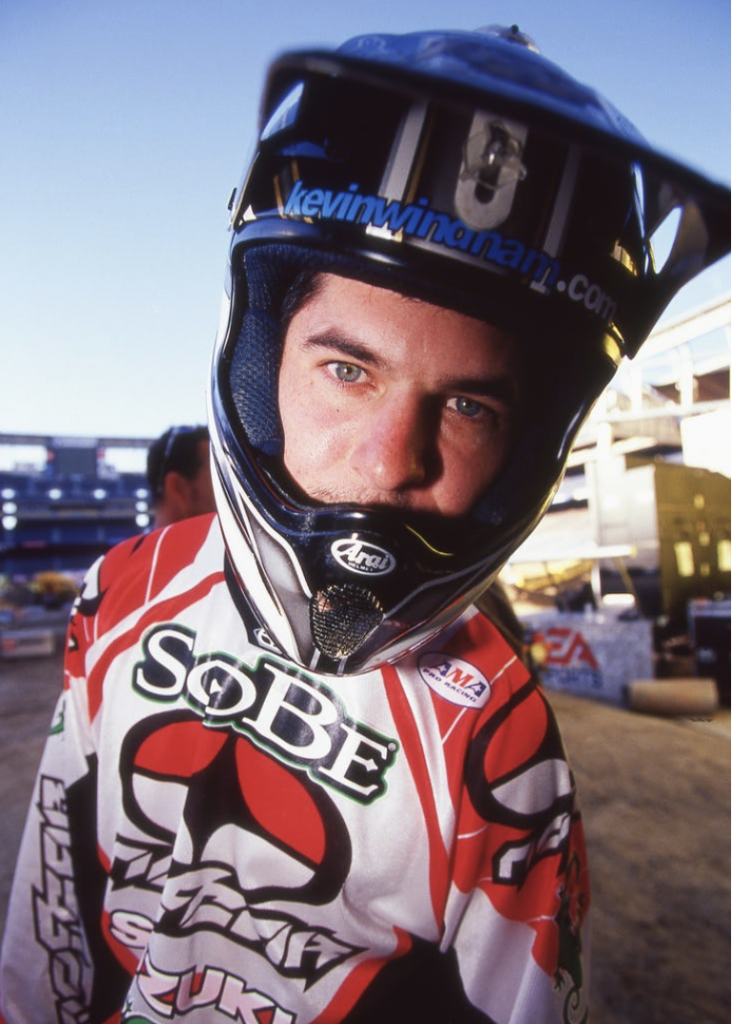
Jeff Majkrzak: I don’t remember exactly the sequence of events. I don’t remember what supercross it was at, but it was Chuck Miller, Zig, and I were up in the stands talking and the concept kind of came up. We just threw out the idea of him coming on board with us. I think it was a good fit at that point. I don’t think Honda was ready to take him back and it was just a good landing spot for everybody. Probably a good landing spot for K-dub, but a really good landing spot for kind of everybody involved. Kind of fit well.
Miller: We sent him the bike but Ziggy was part of it for sure. We were toying with the idea. When Kevin came to Honda, and whatever issues and personality conflicts maybe within the team, and he left to go to Suzuki. Each team has its own atmosphere. He struggled there. Then when he got hurt, it was like, maybe he was done. But when we started toying with the idea, we had bikes. I always admired Kevin. We all did. He just wanted to go out and ride and have fun.
Surwall: It was smart on Chuck’s part. Kevin’s a good one to try the thing. He has the talent, has the riding style to make that bike work well.
Miller: We put together a bike and put on some Gucci [works] parts, and some forks. We put his number on. It had everything on it. Put it in a crate and shipped it to him. He was so happy just to go ride again, and not have the pressure and just enjoy himself. I think at the time the supercross season was going on. He hinted that he might want to ride again outdoors.
Surwall: Well, I knew he was riding again because he started needing gear. He started needing helmets and other stuff. So I knew he was starting to ride again. He redid his track down there and was getting back into riding and felt good. I know Ally was excited because Kevin was flying on the thing, apparently.
Windham: I didn’t do anything until that Honda showed up. I’m pretty sure Ziggy was behind that, getting a bike down to the house. It just randomly shows up. It’s funny. I still had my supercross track, even though I wasn’t doing anything. So this Honda shows up. I put on cowboy boots. I’m in regular pants with a short-sleeve shirt and I put on a Harley helmet with no goggles and do my supercross triple and snap a picture and send it back to Ziggy. We need to find that photo.
Lars Lindstrom: When I started at Honda, it was the summer of 2000, and that’s when he left for Suzuki. We sent him a production 450. That’s when the 450s had just come out. So he had never ridden a four-stroke before, to my knowledge. Obviously, he always had a good relationship with the Honda guys. It had only been a couple of years since he left the team.
Windham: I got the four-stroke and was like, how do you start it? What’s this extra lever up here?
Lindstrom: After that, we sent him a works bike. The other thing I remember is that he was like, “Yeah, it’s awesome. I went like a second and a half faster.” I remember some of us commenting like, a works bike, that’s all you get? One and a half seconds?
Jeff Majkrzak: I was absolutely concerned. I had some questions before we met him, and then you meet him and it didn’t take long. He was kind of ready for the next chapter. 2003 in supercross, he came to a race and in the truck right in the middle of the evening because I remember we just came in and I remember him sitting up on our counter in our truck. We sat and talked in the middle of the truck, and there wasn’t anybody around. So I think it was kind of right in the middle of the evening. It actually happened really quite fast after that. He had a real, logical self-examination of what had transpired and where he had made some mistakes. We spent fifteen, twenty minutes talking one day and I was like, this could really work.
Windham: I’m finally able to make a little bit of sense of my life at this point, I guess. I mean, how many Friday night parties can you go to before you realize racing a supercross bike in front of millions of people is a hell of a lot better than having eight cold beers and a fire?
Surwall: Something had to happen. I’m not saying an injury is good, but it was a good way for him to reset. He’s showing up with more diamond necklaces and watches and jewelry, and stuff that was important to him became not important anymore at all. He realized a lot in the time off. I’m not happy he got hurt, but I’m happy he had time to reevaluate and put it into perspective for what’s important and what’s not.
Windham: I started riding again and started feeling pretty good and somebody at that point said, “Do you want to race again?” And I was, like, “Sure.” That’s pretty much as simple as it sounds.
With those words, Kevin Windham was back racing as a professional and he would tackle the upcoming 2003 Pro Motocross series on a Factory Connection Honda CRF450R. The contract was very loose early on with protection for both sides if Kevin wasn’t happy with the deal or didn’t want to race anymore as well as the team having protection if Windham didn’t perform. It was very low money with good bonuses.
Miller: We kind of at the last minute threw together a deal, Ziggy and I, with him and Jeff, and actually his first contract with us in maybe 2003 was just bikes and parts and expenses. We would pay his hotel and whatever. Maybe Ziggy was paying him some money too, but Kevin just wanted to ride again and get back to where he was. Obviously he had kind of overcome whatever issues he was dealing with at home and the business. He’s such an enthusiast. He’s ridden his whole life. He just was having fun doing it.
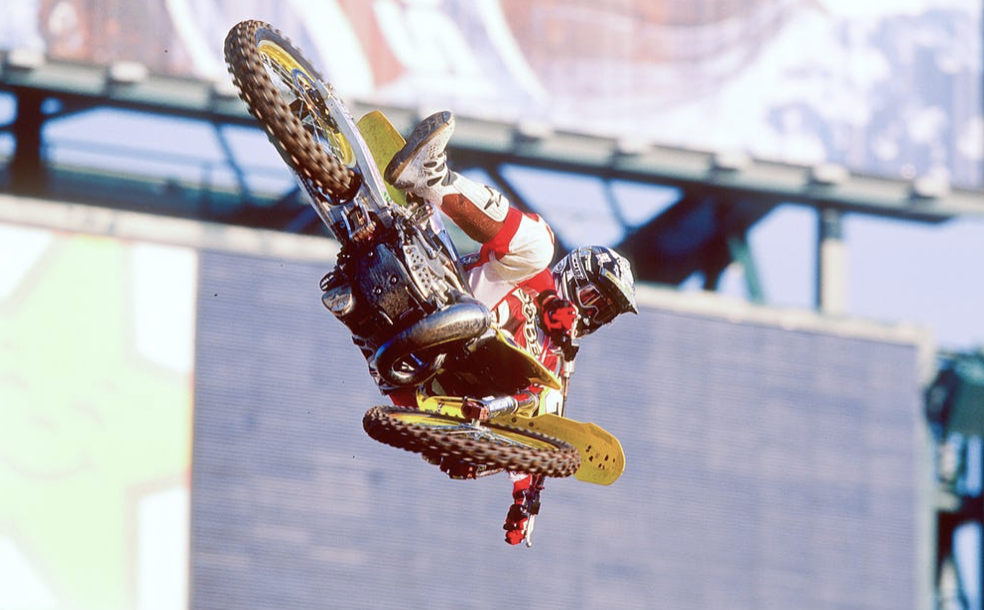
Zielfelder: I don’t remember the exact specifics, but I remember it being, we’re going to do this this summer and see how it works out.
Surwall: He wanted to start getting back into it, but he didn’t know which way to go as far as not wanting all the pressure of sticking him under the Honda tent, autograph signings every Thursday and Friday at the track. He didn’t want to do that. Honda was flexible with how to make it work. I know Ziggy had a relationship with them, and they didn’t really have a premier guy at the time. It was a good option. So I had worked with them in the past and basically that was the path it went.
Miller: We realized that he was kind of better on his own program, away from the factory pressure or the structure that we had. That’s where Ziggy really came in and developed the program around him and Mike.
Stanton: Windham didn’t do well with pressure. Like I said, it was all about him and his own deal, and that’s what made him comfortable.
Miller: That’s where Kevin was. Don’t put any pressure on him which is what a factory would do and a high expectation, he would always exceed your expectation. I’ve seen that with a lot of guys through the industry through the years. They’re just better off on a support team than they are on a factory team. If you can give them the right tools to still be on that support team, that’s really a win-win because it can bring in sponsorship money and everybody outside, even a different type of fan maybe.
Surwall: The deal wasn’t much money to come back, because no one really knew what he was going to be like or doing or whatever. They don’t remember your best moto at Washougal two years ago.
Richardson: I don’t know exactly the timeline of that 2003 supercross season, but Kevin just called me and asked if I had a minute to chat. He said that he was planning to come back and race the outdoor nationals in 2003 with a private effort with Factory Connection and wanted to know if I would be interested in helping him, if Michelin had room and support and everything, if we could help him. He had been very happy with our tires in the past, and that I took good care of him. He knew that I would work well with him and he liked that component of it. So he asked if we were able to help him. From there, it may have been end of March because I told him, “Thanks. We’re flattered, and we definitely can work towards something, but I don’t want you to choose Michelin because you liked our tires in the past or because I took care of you in the past. I want to come test with you with some newer product that we have to make sure that you choose it based on performance.” It was the first off weekend of 2003 supercross season, which was Easter Sunday, was the day I left to drive to Mississippi and work with him. We tested a little bit Monday afternoon. I remember getting there and he was having issues with the bike, trying to get a shock put on that someone had put on there. So I helped him with that. We tested all day Tuesday at his outdoor track.
Ziegfelder: Kevin starts showing up at these tests, and oh, God. Kevin did some things that were just super special. I remember being at an early test and watching him dragging the bars in the corners, and we were like, “Oh, my God. This is unreal.”
Richardson: At the end of the first day that we tested with him at Michelin, I had kind of a man-to-man with him. We were riding and he said he wanted to come back and he wanted to win. “I’m ready to come back and I want to win.” I remember asking him. I said, “I know you say that now, sitting out here on your track, but when you go down in the first turn, do you still want to win? Or if Ricky passes you, do you still want to win?” He said, “Yeah, now more than ever.” So for me that was refreshing. I told him, “Thank you, because I’m going to give you everything I have, but it’s easier for me to do that knowing that you’re giving everything you have.”
Zielfelder: Whatever happened in the past was the past. We treated him just like anybody else and he was good to us. There was nothing ever negative that went on.
Windham: Dottie had no issues with me coming back and was super supportive. I think she just mainly wanted to see me doing it right. When you do it wrong, it’s bad on everybody. Your wife and your spouse whatever, whether it’s a wife or a husband, you don’t really enjoy coming home or getting off of a big work trip and you come in and just talk about how shitty the whole weekend was over and over and over again. Every weekend for 40 weeks a year. I think she was glad that I stepped away when I did, but then when I came back and had a different outlook on life and that part of my life, she was super supportive.
Surwall: I remember he was a little bit freaked out on flying. He wasn’t going to fly commercial anymore. So we had to raise, I think, 60 grand to cover private. He had a friend with a plane that was going to fly him to all the nationals. Not the fastest route in the world. It was a smaller plane. I got a deal with Lee Dungarees, Lee denim, the pants. They came on and helped a lot to cover the cost for Kevin. Had some logos on his shoulders, his bike and his pant legs. Honda let us have space. They paid a good amount, and we did with our gear and stuff and other sponsors. It came together where he could be in his own truck with Factory Connection and head out. He’d fly private and the truck would be at the races.
Windham: Surwall was always great to me, all the way back to the 1-800-COLLECT days. Kind of how I got into Spy and how I got into No Fear, and how I got 1-800-COLLECT. I consider him a great friend. I think things went well for us. He was kind of working somewhat as an agent a little bit, but we were just friends and advice and was in the know. He was very helpful in me getting a lot of my deals and structure back.
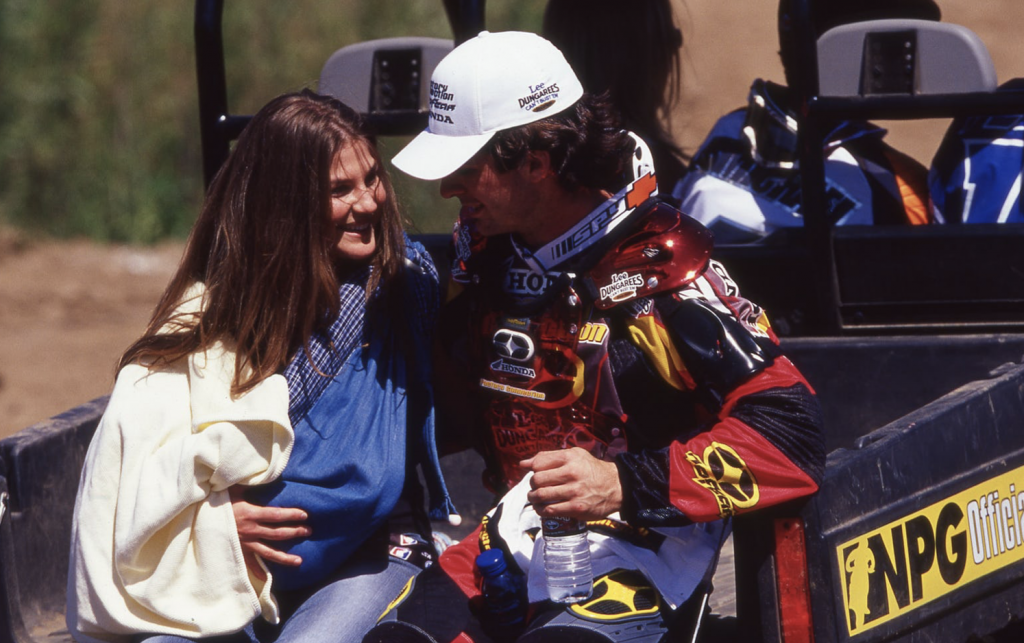
Lindstrom: KW was my favorite, other than Jeremy [McGrath] I guess. He had the best style. He was the guy that when I rode, that’s who I wanted to look like. I was a huge K-dub fan. So when we started sending him bikes and stuff, I was pretty excited. They started talking about maybe something coming together for the nationals, and I was pretty stoked.
Windham: Ricky was never fun to ride with, not on the track or off the track. It seemed to feel like modern-day qualifying practice every single lap. I would do laps and either him or someone on the team would have the stopwatch on me or vice versa. I just kind of would work every single lap. He wasn’t a fun person to compete against.
Lindstrom: The whole thing was kind of surreal to me. We tested at that track, and Ricky was there too. Both of those guys at the same time. Kevin was unbelievable. Everything was weird about that. Chad Watts was there and he wasn’t RC’s mechanic anymore so he was kind of a little bit bitter about the whole thing. He was like, “We’re going to build Windham this awesome bike and show Ricky what’s up.” Obviously, Ricky was on the two-stroke. Kevin was on the 450 because they didn’t think that was comparable to the 250.
Zielfelder: What I will tell you is that at this one test, we had all of our guys there. Honda was there with Ricky. Ricky was on a 250 two-stroke and Kevin was on the 450. It was the first test Honda was involved with Kevin, on that 450. I will tell you that there was a competition going on with the stopwatches between Ricky and Kevin. Kevin went out and would throw down a time, and it would be the best one on the track. They’d finish up working on what they were working on Ricky’s bike. He would go out and just made sure that he dropped it. Then Kevin was up to the challenge. This went on over the course of that first day, like all day. It was insane. It was crazy fun to be around. It was good. It was a healthy competition. There was no negativity between Ricky and Kevin. It was just they were going to prove who was the big dog in the house.
Lindstrom: We go testing and he’s doing better lap times than Ricky. Ricky obviously would always just twist it harder to make sure that he was the fastest guy. Even at the test track, wherever. He didn’t care. So that question was answered quickly.
Surwall: I know Ricky was not happy that Kevin had that bike and didn’t feel like it was cheating, but felt like it was a big advantage. With Kevin’s throttle control and riding style where he didn’t have to work as hard, and Carmichael just was bending the bars basically, pounding that thing into the ground, and just having similar or even a little slower times than Kevin. Kevin was just relaxed about it. You know Ricky. He couldn’t do much more. There was some tension there, for sure. That was also great that Kevin was in his own truck and Ricky was in the other truck, instead of sitting side by side. That’s got to be tough when you head back to the truck and have to sit in a little 8×8 room with everybody.
Windham: I do remember I think it got so contentious out on the test track that Factory Connection and Honda both agreed that, “Okay, it’s our track. It’s Honda’s track, but we’re going to give it to Factory Connection on Tuesdays and Thursdays, and Factory Honda is going to ride Monday, Wednesday, Fridays, or whatever.” I remember it getting to a point where we didn’t go out there together. It was just too much.
Richardson: He looked like K-dub of old, which for me being a fan of his but also having the opportunity to work with him at Suzuki, it was refreshing to see him back and to spend some time over there, a couple days with him and Dottie and seeing where they were in life. He was in a good place and they were in a good place. I was pumped on it. I was looking forward to 2003 for sure.
Windham: In my own critique, I was a great rider and a great practicer. Sometimes I was a great racer. Ricky was a great racer every time the gate dropped and that’s why he is who he is and went on to be the GOAT. I can hold a candle to him. I always felt well practicing. Out at the test track and those things I left every night feeling like I at least held my own against the best in the world. I feel like every day was a battle between he and I, or whoever was out there riding. The only time Ricky and I ever had anything positive to say to each other or about each other… I remember when he crashed that one year and I think he blew his knee out or something and he missed the year. He kind of gave me his blessing to go get the title, which I didn’t get. It was kind of like, “You’re killing it right now. This is your time. Go get it.”

Round one of the series was at Glen Helen and Windham’s pre-season speed showed up in Southern California when he stalked leader David Vuillemin on lap one and right before the end of the first lap, took the lead. It was the first time he had been on a race track in 441 days and he was out front much to the delight of the race fans around the track. Color commentator David Bailey even remarked that he had “forgotten about how stylish Kevin Windham was.” Windham had a ten second lead at one point and led until he collided with a track marker and went down. Struggling to start the bike, Windham eventually finished 14th. The second moto he got a second-place finish behind Carmichael for a fifth overall. Even with the crash it was a very successful return to the sport for the #14.
Zielfelder: It was funny to me because the first national was Glen Helen and KW took the lead early. People were going nuts. He wasn’t always a popular guy in the Suzuki days. People liked him. He had his fan set. Don’t get me wrong. But the fact that he broke his leg, missed all that time, and came back and was beating Ricky, or leading him anyway at times until later in the summer, I was always struck by how much people love this guy now. They liked him before. It wasn’t like he was a bad guy. But man, when he joined your team, I just thought his fandom just went up tenfold. People loved the guy now. It was crazy.
Windham: I’m from Louisiana. It was the LA, man. I think when they saw LA on the entry form, the crowd, they were like, “Yeah, this dude’s from Los Angeles!”
Zielfelder: I think our country likes an underdog story. It doesn’t matter what sport. That was it. Our team has had some luck with jumping in with a couple of guys in situations like this. You give them the tools to go out and try and right what was wrong with their career before. Man, it was fun. It was a lot of fun. I remember that moto. Kevin probably would have got that one done, but he lost the front tire and threw it away.
Lindstrom: That first moto he was gone. Then he hit that hydro barrier. He hit that hard. Jumped off the side of the track. It’s actually in that Great Outdoors video. He landed right into that thing. I think he thought it was going to move out of the way, and it didn’t. It stuck and he just went over the bars really hard. Either way, he was gone. He had a twenty-second lead or something crazy.
Surwall: He was flying. Right in front of me, he cross-rutted a little and hit that water barrel or tire thing and sent him flying. They didn’t start as easy back then and didn’t have electric start. So he sat there for a while. He awakened everybody and was like, holy crap. It was both Kevin. It was like, is it the bike? There was a lot of new stuff about it.
Lindstrom: Then obviously the next moto Ricky was able to cut him down. But I think that whole thing was just kind of awesome for everybody. Someone could finally race with Ricky, both on Hondas, one on a 450, one on a 250. It was a dream for Honda marketing, I would imagine.
Richardson: I think that, and the year prior Ricky won all 24. So, for the fans one a comeback story of a fan favorite even before he got injured. He was a fan favorite. It’s a great comeback story, and someone’s finally beating the guy that won every race the previous year. So I think there were a lot of factors that contributed to everyone going nuts over him leading. I remember it was a wave of emotion around the track.
Windham: Thinking about that race, it makes the hair stand up on my neck and gives me chills like right now.
Lindstrom: I just remember the whole season being super special. We had both the best guys. We had two bitchin bikes. We had a lot of stuff going on there that was just really, really cool for me to experience as a kid, too.
Surwall: Then he went to Hangtown. I think it was the first moto, he just shellacked everybody by thirty seconds. It was like, wow, this is great. I was doing The Great Outdoor movies and Carmichael won every damn moto and we were trying to write a story about the races and lap after lap after lap it’s the same exact story. So it was something I think people enjoyed seeing a challenge. People like a winner for so long, but then after a certain point they’re like, okay. It was great to have someone battling Carmichael. I think people liked that part of it also.
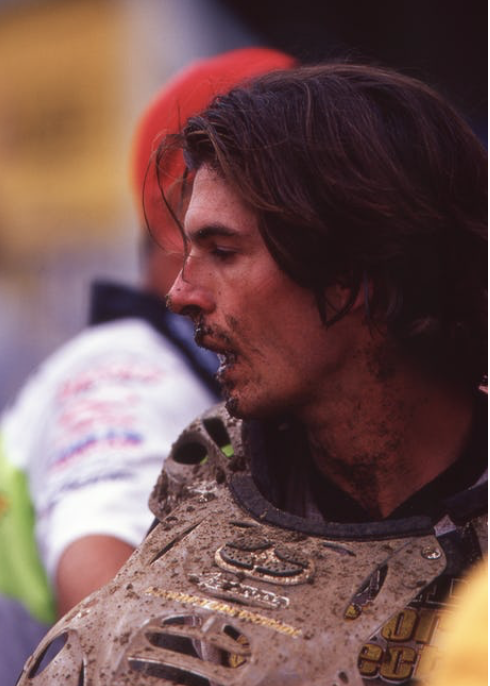
Richardson: I think that first race started building Kevin’s armor, if that makes sense. Ricky’s just so mentally strong that he’s hard to break. He and Chad Reed I think are both similar in their mentality of if you beat them, it doesn’t weaken them. It makes them stronger becoming weak, for some unrealistic reason. Kevin had a moto win here and there, but 1-1 at Unadilla followed up by 1-1 at Washougal were obviously the two really, really high points, high marks of the season for us. But then we get back to Millville that following weekend and Ricky went back to just being Ricky again, just beating someone to the ground.
Lindstrom: I just remember that summer, the first ten, fifteen minutes he’d be just unreal, and then he would be leaning over the front. I remember Ricky’s dad saying that, too, in his southern drawl. “You can always tell when he’s starting to slow down. He hangs over the front of the bike.” He’d be way over the bike, like Johnny Campbell going through Baja or something. Ricky would be able to eat him up. That happened a lot, I think. I remember that being a trend that was kind of frustrating for everybody, especially for him I’m sure.
Stanton: He’s just so naturally talented. And he was that way on a Yamaha when he was an amateur. If you can capitalize on that talent and put in a little work ethic, he was phenomenal. He didn’t have to ride. He was like Stefan Everts. He didn’t have to ride all week. He could just show up to the race and be phenomenal, where Ricky and myself and other guys, they had to ride all week to know that they had the confidence to make it happen. Kevin wasn’t that way.
Windham had a triumphant return to racing on the Honda, breaking Carmichael’s streak of moto wins at 26 the week after Glen Helen, he won Unadilla and Washougal with 1-1 scores and won another moto later in the year. He finished second overall in the series as well.
Windham: I was happy with my season back. That’s me. I’ve kind of been a podium guy. I probably have the most seconds of anybody on the planet. I feel like at that time-I truly think Hannah would probably say he went up against the toughest guys. Stanton would probably say he went up against the toughest guys and whatever. But I felt like the guys I was racing with, when you beat those guys, there wasn’t a lot left on the table, by any party. Winners, losers, it didn’t matter. So that was a tough environment. I don’t want to discredit the guys now and even the guys before me, but with Ricky and the way some of those guys were training and working and hanging it all out there, when I had the best of them, although it be few and far between, that’s big stuff right there.
Semar: There was no pressure. It was good for him. I don’t think with all the guys at Honda, it was Kevin putting the pressure on himself. Honda wasn’t, “Hey, you got to win, you got to win, you got to win.” They wanted him to win. We all did. But he puts a lot of pressure on himself. When he came back for the outdoor season in ’03, he was a different kid for sure.
Surwall: When Kevin’s in a happier spot, he can ride for an hour. He doesn’t get tired if he’s feeling well and his mind is right. Training or not, it’s going to work. You get arm pump when you’re nervous and when you’re holding on too tight and when you’re thinking about the other guy. When Kevin’s comfortable and there’s not, I don’t want to say the pressure or a gun to his head or whatever, he can ride how he rides. He was becoming himself. He’s definitely as much as a mental rider as anybody, or a physical rider.
Honda’s introduction to the new four-stroke world started with the 2002 Honda CRF450R and the bike immediately became the weapon of choice for many privateers in the sport. Yamaha had pioneered the four-stroke, but Honda upped the game with their first model. And there was maybe no rider born to ride a four-stroke more than Kevin Windham, a fact not lost on Kevin or those around him.
Windham: For me, it was relearning riding again, pushing and that kind of thing, not relying on a machine. So, for me it was perfect timing, perfect sense. That was the direction of the sport. Everybody knew it was coming. I had already been off for quite a while. I was a little bit concerned. Honestly my Honda that I recall, especially in the early days in the stock setting, it never imploded on me. I remember Doug Henry and Ryan Hughes, a couple of these OEMs they had some major malfunctions. Just a lot of weird stuff that was going on in that transition period. That was in the back of my head a little bit, but all in all I loved it.
Miller: Poor Ryan [Hughes]. He helped develop that first one in 2001, which was a monster. It threw him on the ground so many times. We learned so much. The bike got better and better. The second or third year is when Kevin and Ricky really took a hold of it and started racing it, but Kevin’s riding style, he was really good at how to work the power and use it the right way and not ride it like a two-stroke, which is one of the strange things when you’re going from two-strokes to four-stokers, how you’ve got to ride it different. Some of the guys didn’t make that transition like Kevin did. Definitely was one of the talented guys riding those bikes for sure.
Majkrzak: I think that bike was the right bike for him. There’s just a lot of things that came together. That bike was an advantage. I’m not sure there was many people who could ride the bike in its infancy like K-dub could. I do think that was an advantage. Obviously, those bikes made great strides, but even the first round of those bikes, Kevin could ride that bike. LaRocco really never could adjust to the 450. Never enjoyed it like K-dub right away.
Windham: I think a lot of times, it just seems to happen in my career, there seems to be a lot of focus on Ricky. I think in a lot of ways just my machine was a one-up factor on him also. I think he still was probably better than me. Heads up 250 to 250 he probably still had a leg up on me. They’re not dumb. They caught onto it very quickly. That machine was an advantage, no doubt about it.
Lindstrom: The way he rode, RPM and power and everything like that, it worked really well for that bike. Throttle control especially. I think he was one of the guys that kind of showed people, especially Ricky. In ’04, the last month before Anaheim 1 RC wasn’t very happy with the two-stroke and he was going to ride a 450. We actually rode Kevin’s bike at Corona and he was like, “Man, this is pretty good.” He just decided, “We’re going to ride a 450.” We went to Castillo Ranch and that’s when his knee popped. I think because Kevin was kind of kicking his ass in ’03 here and there, that made Ricky switch his mind over a little bit because maybe they weren’t that bad.
Zielfelder: He was born to ride a four-stroke. What’s kind of crazy to me is I’m still really good friends with Jojo Keller and Jojo will tell me to this day – he remembers when Kevin first showed up at the Florida Winter Ams riding a KX60. He’s like, “That was the only guy that when everybody was sitting down, he was standing up. When everybody else was standing up, he was sitting down.” Back then, you could tell it was something about the way he rode. That’s kind of exactly what you saw when he got on the four-stroke. It was awesome to watch.
Windham: Getting on that 450 and with Factory Connection definitely changed the course of my life and where I’m at today in a huge way.
The marriage between Factory Connection, Honda, and Kevin Windham was deemed successful and a deal was struck for a full-time return to racing for Windham and the team for 2004 and beyond…
Windham: The whole thing slowly transitioned to where that whole conversation about how much they [FC] cared for me and just wanted me to be safe and really cared about me as a person, versus me as a racer.
Surwall: Going forward he didn’t make the same money as in the hey day, but good money with great bonuses and a full year agreement and everything else. It was good, but it wasn’t as it was before. He was going to have to earn a little bit of it. He wasn’t really even interested in going anywhere else. He had done it long enough and was established and stable enough that it wasn’t about the last hundred bucks here or there, or a thousand here or there. Like I said, mentally it was comfortable for him and that’s what he needed more than he needed a little more money.
Majkrzak: Kevin is exactly who you’d think he’d be to deal with. He was always rational. If something pissed him off you would know it, and he would deal with it. You’ve seen it on the track. If somebody crossed a line, he would retaliate or do what he needed to do to kind of even the score out. There were never any tantrums. You get what you get with K-dub. He’d be frustrated. He’d be pissed off or whatever if something didn’t go right on the track, but he was always easy to talk to. I remember there were years – I’m not necessarily proud of this, but there were years that went by where we didn’t even have a contract. We had a verbal and we didn’t get around to re-signing the agreement because… I don’t know why.
Windham: I was never ever going to race for anyone else, any issues we had in talking contracts, that may have just been my negotiating tactics!
Zielfelder: I can remember behind the scenes a couple of times with Kevin having a meltdown where things weren’t right for him. He was a good guy to work with. He didn’t make it hard on you, but there were a few times where things weren’t gelling. In the right situations, he’d make it known. Kevin was a professional. He knew where and when to let things out. You know it from working at the level you did at the places you did, that not every day is a perfect day on the motorcycle. Kevin was just very, very good about how he handled those not-so-good days.
We know the rest of Kevin Windham’s storied career, wins, podiums, huge fan favorite and a Factory Connection and later, GEICO Honda rider until the end of his career. Windham’s second half of his career didn’t feature championships like the first half, but it was more successful in every other way. To think that at one point and most everyone around him thought it was over makes his successful return all that more impressive. An icon in the sport, Windham provided many fans with more memories than just about every other racer in this time.
Windham: I think everybody always wants to win. I always want to win. Everybody wants to win. But you could see that I think they [Factory Connection] sensed and I sensed and everybody just kind of said, at some point pre-retirement my value was no longer in winning races. It was slowly diminishing. I had the transfer thing going on, a little bit of mentorship to the young guys. To me that just was huge. Again, it wasn’t the biggest pressure. Everybody wants to win. Don’t take it as if they didn’t want me to win. When the opportunity presented itself, we were ready to go and do battle. But the environment was very good for me and helped me thrive, for sure.
Richardson: The racers, regardless of how famous they are, how much money they have, they’re just people like everyone else. You have some that are non-appreciative, arrogant people, and some that are just wholesome, genuine, and appreciative. Kevin Windham was a gentleman in every regard and so appreciative and respectful. I think even more so that year than say in ’01, for example. I think his appreciation for the sport was renewed and his appreciation for everything involved with what he was able to do was renewed. So he was great to work with that year.
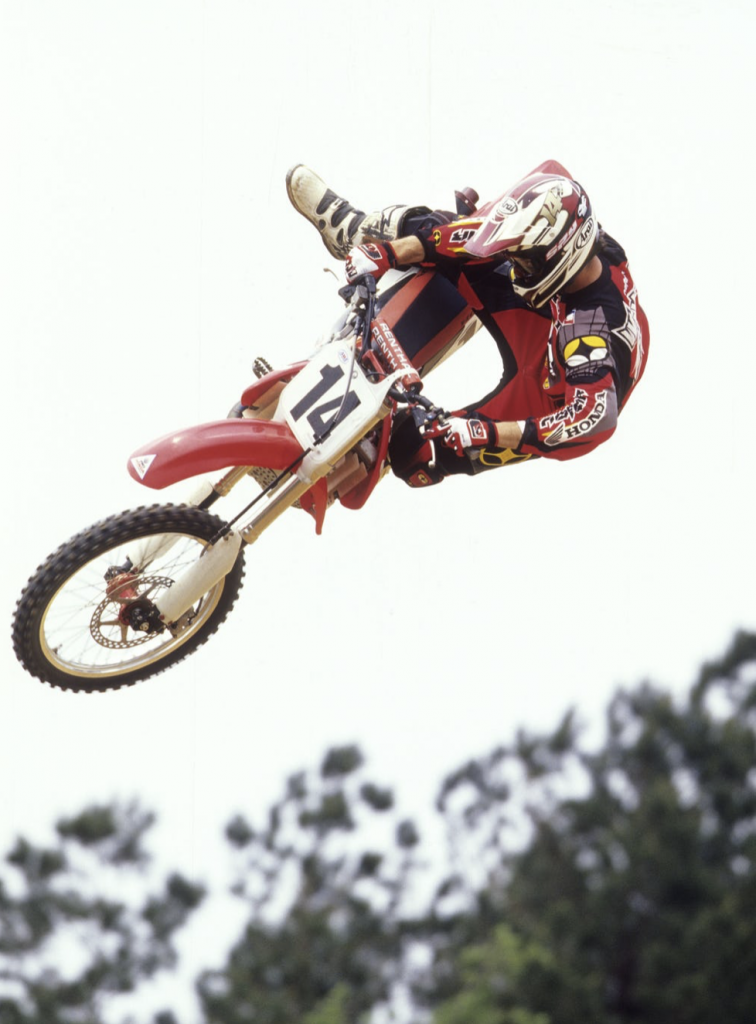 Surwall: Kevin was always Kevin. Always a really good, nice, polite guy. He’s a good guy. When he was in his rock star kind of period with Suzuki, I wasn’t as close to him. I was, but not in hanging out kind of thing. I think Kevin when he came back was more appreciative, understood it a little better, had grown up quite a bit over that year. I think he looked at it as a new opportunity and he appreciated it a lot more. He was making so much and wasn’t happy anyway.
Surwall: Kevin was always Kevin. Always a really good, nice, polite guy. He’s a good guy. When he was in his rock star kind of period with Suzuki, I wasn’t as close to him. I was, but not in hanging out kind of thing. I think Kevin when he came back was more appreciative, understood it a little better, had grown up quite a bit over that year. I think he looked at it as a new opportunity and he appreciated it a lot more. He was making so much and wasn’t happy anyway.
Windham: Undoubtedly, no matter what, the second half of my career and that whole next chapter, talking about Factory Connection and moving on, there were some great races, but I can tell you that the fans made it what it was for me. I think it was a decent comeback story. There was still alcohol involved and I spent time with fans after the races. I loved to hang out and talk and spend time with everyone. I wasn’t a stick in the mud, by any stretch of the imagination. The only difference was that I took the work more serious. When we were racing, everybody was pretty much drinking. Maybe not Ricky, but a lot of them were. I think that’s good. I don’t have an issue with that at all. I think there’s plenty of time to socialize and be human. A long list of things that for some reason we connected with the fans and my team and me specifically, but I really appreciate that relationship we had. It really made the second chapter pretty awesome.
Stanton: About three or four years later when he was on GEICO, he came to me and gave me a hug and thanked me for everything. Got all emotional and cried. He in turn had kids and all that. So that’s the whole Suzuki thing. Our relationship really got tattered. We started off super great, best of buddies. Then that happened and our relationship got tattered.
Windham: I think any kind of dispute I had with Stanton over him trying to right my wrongs was just kind of me not being mature enough and ready to take advice. Going back to the old headstrong comment we made earlier. Last time I saw Stanton was actually down here in my area getting one of his dogs trained. We just went and had dinner and had a nice visit. But I do know that I have some great friends that are industry. Either they were when I was there or even now that really were good people and good friends of mine.
Lindstrom: I was his mechanic in 2007 and he’s a great guy to work with. He treats you well and everything like that. I was definitely a little bit intimidated because I’d known him a long time. He’s so clever too. He’s a really, really smart guy. The things he says, his one-liners. He’s so quick. He’s really funny. I was pretty intimidated by him. My first “real” guy. I worked with Jeremy when he did the one-off things and the part-time stuff. But he was my first real guy. I really enjoyed working with him, especially his whole family too and going to Mississippi. He took me up in his plane, stuff like that. It was cool. He was always really generous with the whole team. We’d go to a big dinner and he would pick up the tab, no problem. Go to his house and he’d show you around. His wife is like the coolest person ever. She’s a really great person that treats everybody really well. Whenever I’d go there to stay, she’d treat you like family.
Majkrzak: When we had the first 250s in ’04. The first few years of the 250 program we were struggling. Kevin, from a sponsor standpoint, he kind of stole the show and gave us a lot of ability to keep building the 250 team. He delivered a lot of value to key sponsors and would help kind of build our organization.
Zielfelder: Kevin was so popular. Our team rode the coattails of his successes. Chuck Miller never gets the credit for being as insightful as he was behind the scenes.
Windham: I think everybody who knows Chuck would echo. He just carries such a great, positive persona. Just super professional and a great individual. I enjoyed our time together as well.
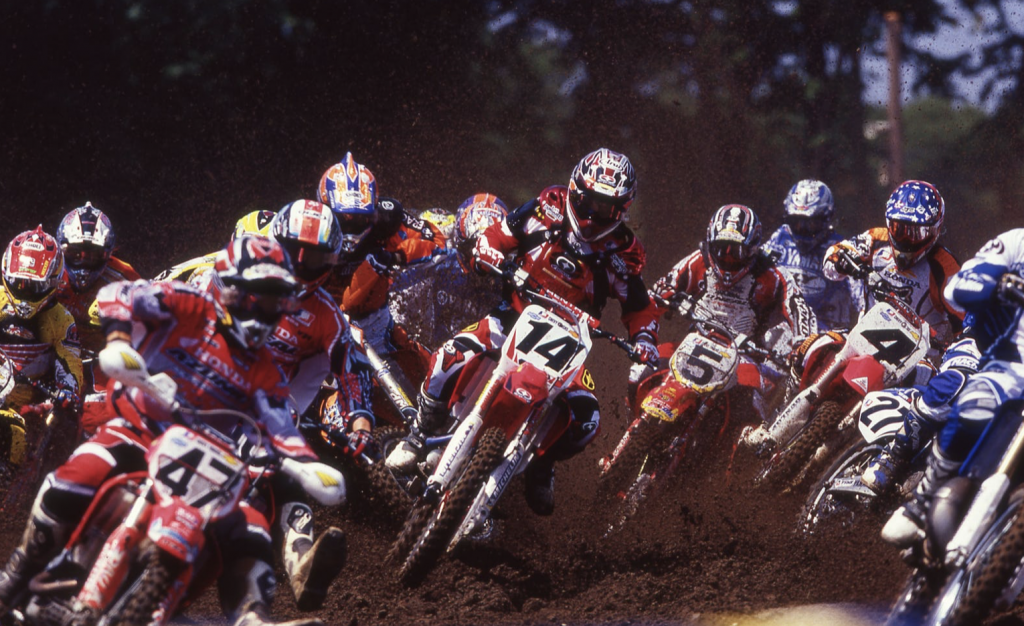
Miller: Everybody loves Kevin and loves his straightforward personality. It was great for him, for sure. We’re happy for him.
Zielfelder: I will tell you today, I probably enjoy my conversations with Kevin more today than I did then. He’s such a good dude and he’s so fun to be around in almost any situation. Truly loved every minute that we spent at races together, and I truly value the friendship that we have today, even after the racing career is over.
Windham: I love Ziggy. I still to this day text him probably once every quarter, or something like that. We always have a great dialogue. Both equally agree that we wish that I could come back and be involved in some way. Timing is everything in life. He understands that. The Planet Fitness thing for us has been a lot of work, but a great direction for me. We’ve built something really good with that, my wife and I. She’s been working her butt off on it too. Timing is just everything and it’s not in the cards right now. We continue to hold a great relationship with both him and Jeff Majkrzak. What great people. What really was awesome for me is how the end of the second chapter, flashing forward to 2013, kind of where I was at in that time where I really hung it up for good, you’ve never seen two people more supportive and sincerely concerned for me and my family and the direction I go from there. None of their advice, none of their comments were self-serving or any of that. It was just all about what was right for me. While a kind of odd second retirement as well, it was the right call at that time. Above everything else, and I already knew it, but that alone really solidified who they were and how much love and care they had for me.

